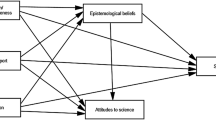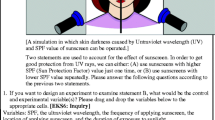Abstract
The research questions addressed in this study were: what types of epistemological beliefs do elementary students have; what types of metacognition do elementary students have; and what are the relationships among students’ perceived characteristics of constructivist learning environment, metacognition, and epistemological beliefs. A total of 626 students enrolled in sixth, seventh, and eight grades of nine elementary public schools located in Ankara, Turkey constituted the participants of this study. Constructivist learning environment survey (CLES), Junior metacognitive awareness inventory (Jr. MAI), and Schommer epistemological belief questionnaire (EB) were administered to students. Factor Analysis of Jr. MAI revealed both knowledge of cognition and regulation of cognition items were loaded into one factor. Confirmatory factor analysis of EB revealed a four factor structure namely innate ability, quick learning, omniscient authority, and certain knowledge. Regression analyses revealed that metacognition and omniscient authority were significant predictors of personal relevance dimension of CLES. Metacognition was found as the only predictor of the student negotiation. Innate ability and metacognition significantly contributed to uncertainty. This study revealed that the elementary students with different mastery levels hold different epistemological beliefs and multi-faceted nature of elementary school students’ metacognition was seemed to be supported with this study. It was found that metacognition contributed to model more than epistemological beliefs for all three dimensions of CLES.


Similar content being viewed by others
References
Aldridge, J. M., Fraser, B. J., & Sebela, M. P. (2004). Using teacher action research to promote constructivist learning environment in South Africa. South African Journal of Education, 24(4), 245–253.
Aldridge, J. M., Fraser, B. J., Taylor, P. C., & Chen, C. (2000). Constructivist learning environments in a cross-national study in Taiwan and Australia. International Journal of Science Education, 22, 37–55.
Baxter Magolda, M. B., & Porterfield, W. (1988). Intellectual development: Linking theory and practice. Washington, DC: American College Personnel Association.
Belenky, M. F., Clinchy, B. M., Goldberger, N. R., & Tarule, J. M. (1986). Women’s ways of knowing. New York: Basic Books.
Berberoglu, G., & Hei, L. M. (2003). A comparison of university students’ approach to learning across Taiwan and Turkey. International Journal of Testing, 3(2), 173–187.
Biggs, J. B. (1987). Student approaches to learning and studying. Hawthorn: Australian Council for Educational Research.
Boyes, M. C., & Chandler, M. (1992). Cognitive development, epistemic doubt, and identity formation in adolescence. Journal of Youth and Adolescence, 21, 277–304.
Bransford, J. D., Brown, A. L., & Cocking, R. R. (1999). How people learn: Brain, mind, experience, and school. Washington, DC: National Academy Press.
Braten, I., & Stromso, H. I. (2005). The relationship between epistemological beliefs, implicit theories of intelligence, and self-regulated learning among Norwegian postsecondary students. British Journal of Educational Psychology, 75, 539–565.
Bronfenbrenner, U. (1979). The ecology of human development. Cambridge, MA: Harvard Press.
Brown, A. L. (1978). Knowing when, where, and how to remember: A problem of metacognition. Advances in Instructional Psychology, 1, 77–165.
Cano, F. (2005). Epistemological beliefs and approaches to learning: Their change through secondary school and their influence on academic performance. British Journal of Educational Psychology, 75(2), 203–221.
Cohen, J. (1988). Statistical power analysis for the behavioral sciences (2nd ed.). London: Lawrence Erlbaum Associates.
Conley, A. M., Pintrich, P. R., Vekiri, I., & Harrison, D. (2004). Changes in epistemological beliefs in elementary science students. Contemporary Educational Psychology, 29, 186–204.
Cross, D. R., & Paris, S. G. (1988). Development and instructional analyses of children’s metacognition and reading comprehension. Journal of Educational Psychology, 80(2), 131–142.
Fraser, B. J. (2003). Science learning environments: Assessment, effects and determinants. In B. J. Fraser & K. G. Tobin (Eds.), International handbook of science education (pp. 527–564). Dordrecht: Kluwer.
Hennessey, M. G. (1999). Probing the dimensions of metacognition: Implications for conceptual change teaching learning. Paper presented at the annual meeting of the National Association for Research in Science Teaching (NARST), Boston, MA, March 28–31.
Johnson, B., & McClure, R. (2004). Validity and reliability of a shortened, revised version of the constructivist learning environment survey (CLES). Learning Environments Research, 7, 65–80.
King, P. M., & Kitchener, K. S. (2004). Reflective judgment: Theory and research on development of epistemic assumptions through adulthood. Educational Psychologist, 39, 5–18.
Kitchener, K. S. (1986). The reflective judgment model: Characteristics, evidence, and measurement. In R. A. Mines & K. S. Kitchener (Eds.), Adult cognitive development: Methods and models (pp. 76–91). New York: Praeger Publishing.
Kuhn, D. (1991). The skills of argument. Cambridge: Cambridge University Press.
Ministry of Education (MEB). (2005). Elementary science program for 6th–8th grade students.
Perry, W. G., Jr. (1968). Patterns of development in thought and values of students in a liberal arts college: A validation of a scheme. Cambridge, MA: Bureau of Study Counsel, Harvard University. (ERIC Document Reproduction Service No. ED 024315).
Pintrich, P. R. (2002). The role of metacognitive knowledge in learning, teaching, and assessing. Theory into Practice, 41(4), 219–225.
Schommer, M. (1990). The effects of beliefs about the nature of knowledge on comprehension. Journal of Educational Psychology, 82, 498–504.
Schommer, M. (1994). Synthesizing epistemological belief research: Tentative understandings and provocative confusions. Educational Psychology Review, 6(4), 293–319.
Schommer, M. (1998). The influence of age and education on epistemological beliefs. The British Journal of Educational Psychology, 68, 551–562.
Schommer, M., Calvert, C., Gariglietti, G., & Bajaj, A. (1997). The development of epistemological beliefs among secondary students: A longitudinal study. Journal of Educational Psychology, 89, 37–40.
Schommer-Aikins, M. (2004). Explaining the epistemological belief system: Introducing the embedded systemic model and coordinated research approach. Educational Psychologist, 39(1), 19–29.
Schommer-Aikins, M., Duell, O. K., & Hutter, R. (2005). Epistemological beliefs, mathematical problem-solving beliefs, and academic performance of middle school students. The Elementary School Journal, 105(3), 289–304.
Schommer-Aikins, M., Mau, W., Brookhart, S., & Hutter, R. (2000). Understanding middle students’ beliefs about knowledge and learning using multidimensional paradigm. Journal of Educational Research, 94, 120–127.
Schraw, G., Crippen, K. J., & Hartley, K. (2006). Promoting self-regulation in science education: Metacognition as part of a broader perspective on learning. Research in Science Education, 36, 111–139.
Schraw, G., & Denison, R. S. (1994). Assessing metacognitive awareness. Contemporary Educational Psychology, 19, 460–475.
Schraw, G., & Moshman, D. (1995). Metacognitive theories. Educational Psychology Review, 7(4), 351–371.
Schunk, D. H., Pintrich, P. R., & Meece, J. L. (2008). Motivation in education: Theory, research, and applications (3rd ed.). Upper Saddle River, NJ: Pearson Education.
Sperling, R. A., Howard, B. C., Miller, L. A., & Murphy, C. (2002). Measures of children’s knowledge and regulation of cognition. Contemporary Educational Psychology, 27, 51–79.
Taylor, P., & Fraser, B. (1991). CLES: An instrument for assessing constructivist learning environments. Paper presented at the annual meeting of the National Association for Research in Science Teaching, The Abbey, Fontane, Wisconsin.
Taylor, P., Fraser, B. J., & Fisher, D. L. (1995). Monitoring constructivist classroom learning environments. Paper presented in National Association for Research in Science Teaching (NARST), San Francisco, CA.
Taylor, P., Fraser, B. J., & Fisher, D. L. (1997). Monitoring constructivist classroom learning environments. International Journal of Educational Research, 27, 293–302.
Tsai, C. C. (2000). Relationships between student scientific epistemological beliefs and perceptions of constructivist learning environments. Educational Research, 42(2), 193–205.
Yilmaz-Tuzun, O., Cakiroglu, J., & Boone, W. J. (2006). Turkish high school student’s perceptions of constructivist learning environment in chemistry classrooms and their attitudes toward chemistry. Paper presented and published in the proceedings of National Association for research in Science Teaching (NARST), San Francisco, CA.
Yilmaz-Tuzun, O., & Topcu, S. M. (2008). Relationships among preservice science teachers’ epistemological beliefs, epistemological world views, and self-efficacy beliefs. International Journal of Science Education, 30(1), 65–85.
Zimmerman, B. J. (1986). Becoming a self-regulated learner: Which are the key sub-processes? Contemporary Educational Psychology, 11, 307–313.
Zimmerman, B. J. (1990). Self-regulated learning and academic achievement: An overview. Educational Psychologist, 25(1), 3–17.
Zimmerman, B. J. (1995). Self-regulatory involves more than metacognition: A social cognitive perspective. Educational Psychologist, 30(4), 217–221.
Zimmerman, B. J. (1998). Academic studying and development of personal skill: A self-regulatory perspective. Educational Psychologist, 33(2/3), 73–86.
Author information
Authors and Affiliations
Corresponding author
About this article
Cite this article
Yilmaz-Tüzün, Ö., Topcu, M.S. Investigating the Relationships Among Elementary School Students’ Epistemological Beliefs, Metacognition, and Constructivist Science Learning Environment. J Sci Teacher Educ 21, 255–273 (2010). https://doi.org/10.1007/s10972-009-9163-6
Published:
Issue Date:
DOI: https://doi.org/10.1007/s10972-009-9163-6




